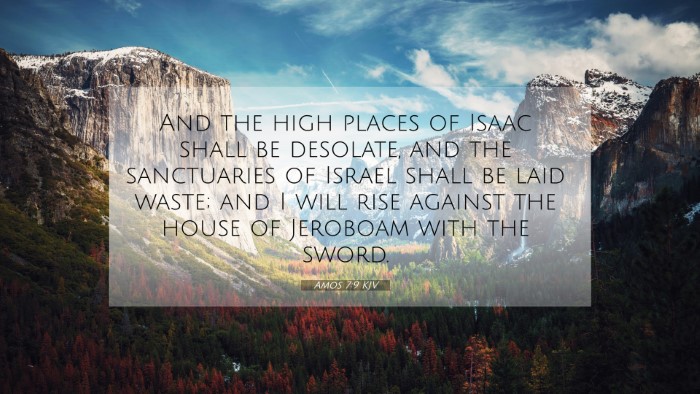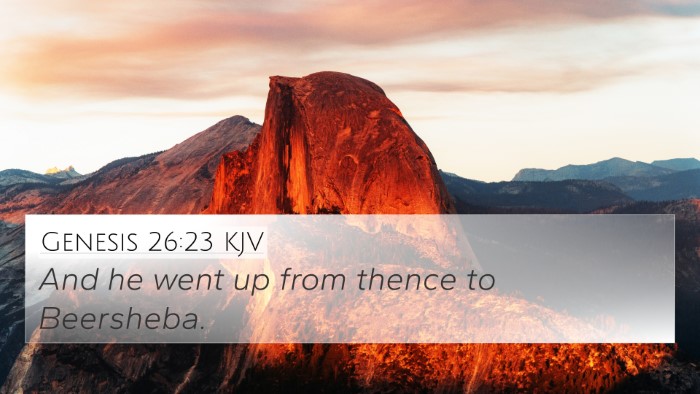Old Testament
Genesis Exodus Leviticus Numbers Deuteronomy Joshua Judges Ruth 1 Samuel 2 Samuel 1 Kings 2 Kings 1 Chronicles 2 Chronicles Ezra Nehemiah Esther Job Psalms Proverbs Ecclesiastes Song of Solomon Isaiah Jeremiah Lamentations Ezekiel Daniel Hosea Joel Amos Obadiah Jonah Micah Nahum Habakkuk Zephaniah Haggai Zechariah MalachiAmos 7:9 Similar Verses
Amos 7:9 Cross References
And the high places of Isaac shall be desolate, and the sanctuaries of Israel shall be laid waste; and I will rise against the house of Jeroboam with the sword.
Uncover the Rich Themes and Topics of This Bible Verse
Listed below are the Bible themes associated with Amos 7:9. We invite you to explore each theme to gain deeper insights into the Scriptures.
Amos 7:9 Cross Reference Verses
This section features a detailed cross-reference designed to enrich your understanding of the Scriptures. Below, you will find carefully selected verses that echo the themes and teachings related to Amos 7:9 KJV. Click on any image to explore detailed analyses of related Bible verses and uncover deeper theological insights.
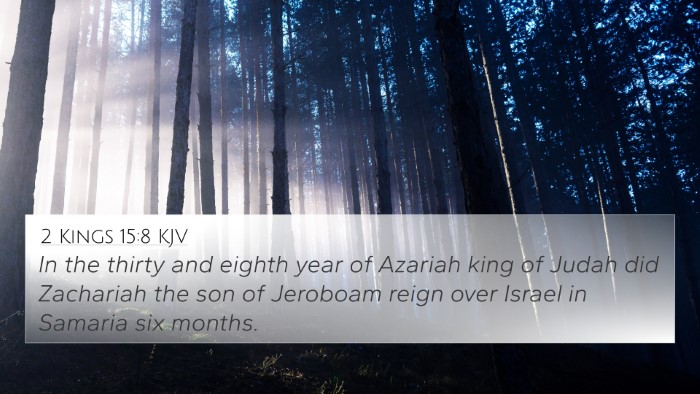
2 Kings 15:8 (KJV) »
In the thirty and eighth year of Azariah king of Judah did Zachariah the son of Jeroboam reign over Israel in Samaria six months.
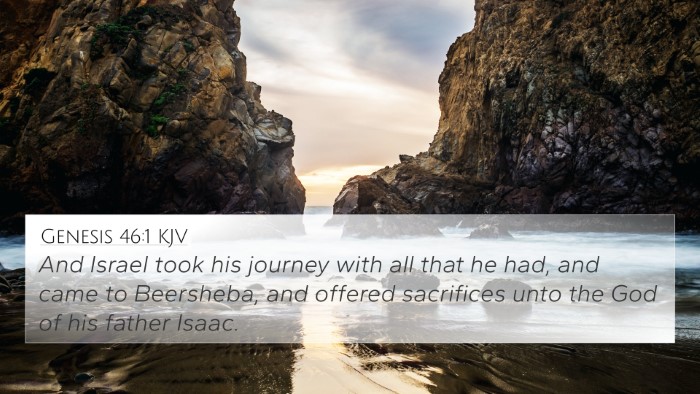
Genesis 46:1 (KJV) »
And Israel took his journey with all that he had, and came to Beersheba, and offered sacrifices unto the God of his father Isaac.
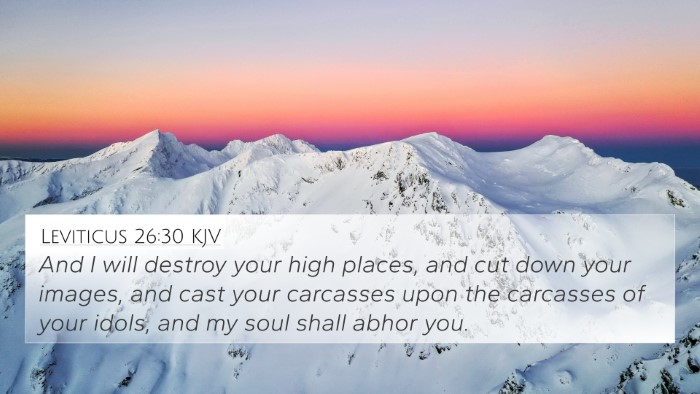
Leviticus 26:30 (KJV) »
And I will destroy your high places, and cut down your images, and cast your carcasses upon the carcasses of your idols, and my soul shall abhor you.
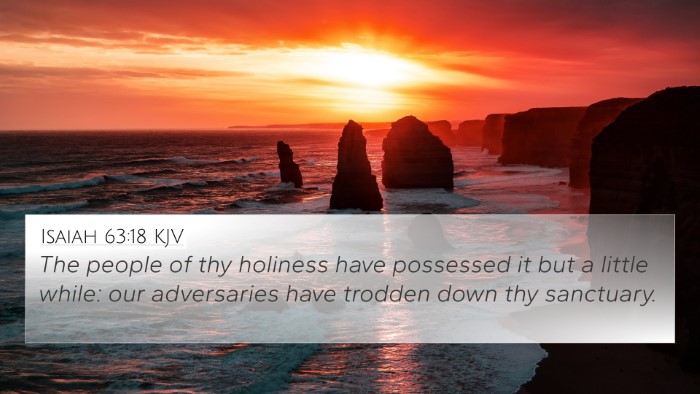
Isaiah 63:18 (KJV) »
The people of thy holiness have possessed it but a little while: our adversaries have trodden down thy sanctuary.
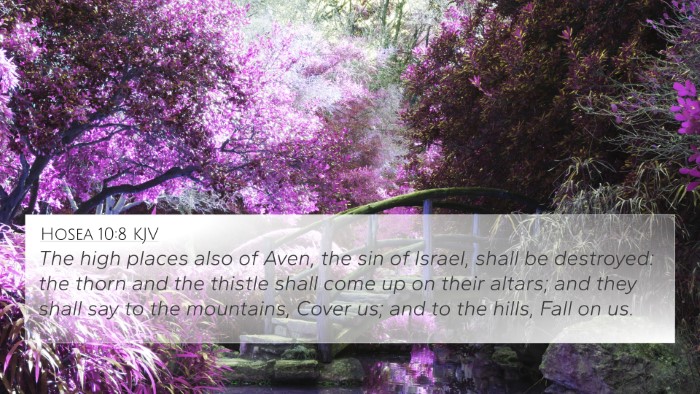
Hosea 10:8 (KJV) »
The high places also of Aven, the sin of Israel, shall be destroyed: the thorn and the thistle shall come up on their altars; and they shall say to the mountains, Cover us; and to the hills, Fall on us.
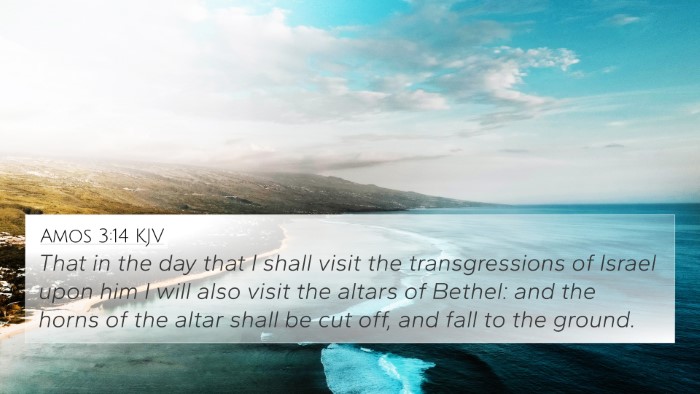
Amos 3:14 (KJV) »
That in the day that I shall visit the transgressions of Israel upon him I will also visit the altars of Bethel: and the horns of the altar shall be cut off, and fall to the ground.
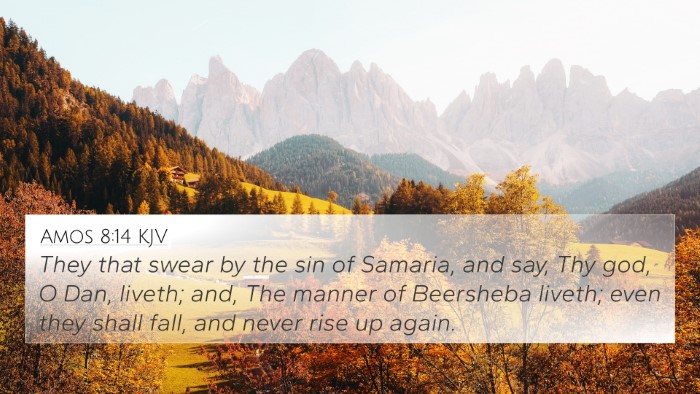
Amos 8:14 (KJV) »
They that swear by the sin of Samaria, and say, Thy god, O Dan, liveth; and, The manner of Beersheba liveth; even they shall fall, and never rise up again.
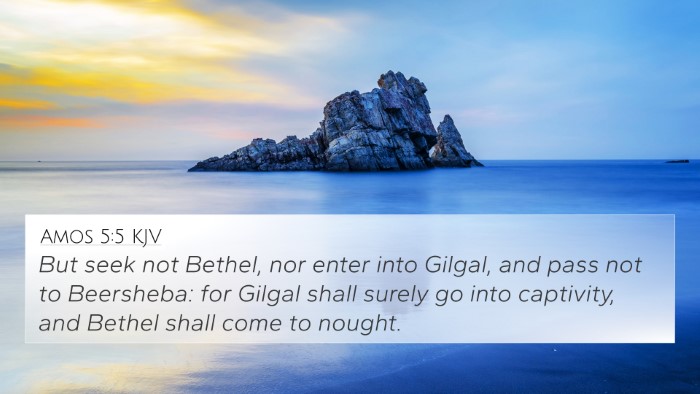
Amos 5:5 (KJV) »
But seek not Bethel, nor enter into Gilgal, and pass not to Beersheba: for Gilgal shall surely go into captivity, and Bethel shall come to nought.
Amos 7:9 Verse Analysis and Similar Verses
Understanding Amos 7:9
Amos 7:9 states: "And the high places of Isaac shall be desolate, and the sanctuaries of Israel shall be laid waste; and I will rise against the house of Jeroboam with the sword."
Verse Context and Summary
This passage is part of the prophetic declaration by Amos, a shepherd and rustic from the southern kingdom of Judah, addressing the northern kingdom of Israel. The message reflects God's judgment against the idolatrous practices prevalent in Israel and specifically targets the high places, which were sites of worship that deviated from proper worship of Yahweh.
Commentary Insights
This verse highlights a crucial theme in the Bible regarding the sanctity of worship and the consequences of turning away from God's commandments.
Matthew Henry's Commentary
Henry emphasizes the significance of the high places as symbols of Israel's idolatry. He explains that the high places of Isaac and the sanctuaries intended for true worship have become desolate because of Israel's rebellion against God. The notion of God rising against Jeroboam signifies the impending judgment not just for the individual ruler but for the entire nation that has abandoned divine worship.
Albert Barnes' Notes
Barnes interprets this verse as a clear warning of God's impending judgment. He points out that the "high places" were unapproved sites of worship where people sought to pervert the worship of God. He connects this passage to the broader theme of divine justice, indicating that the desolation of these high places signifies the broader destruction of Israel due to its unfaithfulness.
Adam Clarke's Commentary
Clarke expands on the phrase "the sword," suggesting it symbolizes the violent judgments that will come upon Jeroboam's house. He notes that the high places were erected for convenience but ultimately led to infidelity against the God of Israel. This commentary underscores the necessity for worship aligned with the true God, as any deviation leads to dire consequences.
Related Bible Verse Cross-References
- 2 Kings 23:19 - This verse recounts the destruction of high places by King Josiah, illustrating the continuation of God's judgment against idolatry.
- Hosea 4:13 - Here, the idolatrous practices in the high places are condemned, linking back to the central theme of Amos 7:9.
- Isaiah 10:26 - God's judgment and the use of a scourge against His people reflect the consequences foretold in Amos.
- Jeremiah 17:6 - The metaphor of a shrub in the desert mirrors the desolation described in Amos concerning Israel's high places.
- Matthew 21:12 - Jesus cleansing the temple parallels Amos' critique of improper worship locations, emphasizing God's dwelling place should be pure.
- Amos 3:14 - The Lord's judgment against the altars of Bethel is a direct connection to disobedience and its consequences.
- Exodus 20:5 - The commandment against idolatry directly relates to the reason for the judgment depicted in Amos.
- 1 Kings 12:31 - This verse discusses Jeroboam's establishment of high places, which ultimately led Israel into sin.
- Isaiah 1:29-31 - A similar warning concerning idol worship and the resultant decay illustrates the depth of God's displeasure.
- Micah 1:6 - Prophetic utterance regarding judgment and desolation directly ties back to Amos' warnings.
Conclusion
In Amos 7:9, we encounter a profound message about the consequences of turning away from God. The verse not only calls for reflection on Israel's idolatry but serves as an enduring reminder of the importance of true worship. The biblical cross-references enrich our understanding by highlighting consistent themes of divine judgment against unfaithfulness throughout scripture.
For those interested in Bible verse cross-references and thematic connections, studying passages like Amos 7:9 offers deep insights into the nature of God's covenant with His people and the expected faithfulness that is crucial in maintaining that relationship.


